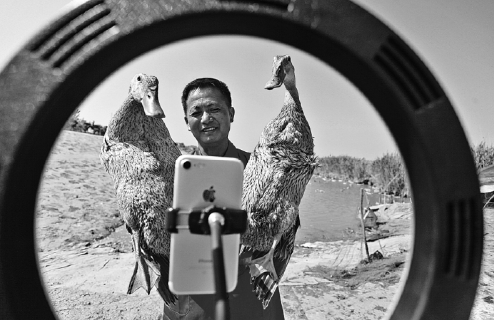Livestreaming bringing online sales to life
Celebrity endorsements, business executives' and government officials' engagement help boost latest e-commerce trend

Luo Yonghao, the flamboyant founder of smartphone brand Smartisan Technology, shaved his beard in front of a webcam in his first ever livestreaming event on April 1.
The 48-year-old Chinese entrepreneur, known for his catchy comments on trendy products and topics, became a livestreamer recently and began promoting razors and other products.
"To decide to shave is not easy as I have kept my beard for more than 10 years. But it can better display the product, and more importantly, reflects my determination to throw myself into the livestreaming e-commerce sector."
Behind Luo's transformation is a multi-billion-dollar market in China that is expected to grow faster after the epidemic pushed offline shopping online.
Not only Luo, but a group of leading executives have joined the phenomenon, such as founder of education giant New Oriental Corp Yu Minhong, chairman of New Hope Group Liu Yonghao, CEO of Hema Fresh stores Hou Yi and CEO of online travel agency Ctrip Liang Jianzhang.
Millions of consumers are drawn to livestreaming events and are increasingly enticed to open their wallets for promoted goods and services. The craze has made livestreaming the latest darling of the traditional e-commerce sector during the pandemic.
China has arguably become the biggest engine of the global online influencer economy, which, according to the Chinese Academy of Social Sciences, generated more than $7.9 billion in revenue last year.
The sector is reaching another new high with the engagement of government authorities. Senior officials from Hubei province acted as salespeople to introduce local specialties on short video platforms while mayors and county chiefs from provinces including Shandong and Jiangxi also boarded the livestreaming bandwagon on e-commerce platforms to promote fruits that failed to get to market due to the contagion.
During last month's visit to Jinmi village, Zhashui county, Shaanxi province, President Xi Jinping spoke with villagers who were preparing for livestreaming of their agricultural products.
Xi pointed out that e-commerce through livestreaming is an emerging business with great potential that can promote sales of agricultural products and help rural residents shake off poverty and facilitate rural vitalization.
Located in the Qinling Mountains, Jinmi has emerged from poverty in recent years by developing the black fungus industry. According to Zhang Pei, Zhashui's deputy county chief, sales of black fungus via livestreaming events during just one night equaled the county's total online sales of such products for four months.
The National Development and Reform Commission has launched an action plan to encourage newer business models including e-commerce, new retailing and online consumption. The Ministry of Commerce has also launched guidelines to encourage small and mediumsized companies to sell products through livestreaming.
"The government officials' and company executives' appearance in these livestreaming e-commerce activities has transformed the traditional practices of e-commerce," said Lao Guoling, director of the e-commerce center at Shanghai University of Finance and Economics.
"The move has also boosted the confidence of both consumers and companies, which is expected to offset some anxiety brought about by the epidemic," Lao said.
With livestreaming e-commerce boosted to a new level, the variety of goods sold on e-commerce platforms has expanded from cosmetics to food, home appliances, tech gadgets and even trucks and homes.
Market consultancy iiMedia Research said the market size of livestreaming e-commerce is likely to exceed 961 billion yuan ($136 billion) this year, increasing more than 121 percent year-on-year.
In Luo Yonghao's debut livestreaming event, more than 48 million people watched the show and over 910,000 sets of products-including tech gadgets, foods and snacks-were sold.
Though the exact revenue has not been announced, a source who did not wish to be named indicated that Luo's revenue from Yinlang-a virtual currency on Douyin, which the short video platform offers bloggers based on the number of viewers-hit 3.6 million yuan. This is apart from the advertising fees paid by Douyin and the 22 brands Luo was associated with, said the source.
By April 22, Luo had held three livestreaming shows. He disclosed in his social media account that total sales revenue hit about 200 million yuan.
For companies who joined the show, it is a win-win business. For example, brands participating in Luo's livestreaming events included tech giant Lenovo Group and Xiaomi Corp, multinational firms like P&G, as well as emerging startups such as projector maker Xgimi.
Among the other products sold through livestreaming were Chinese lobsters from supplier Xinliangji, vouchers from milk tea maker Nayuki as well as a gel pen from Xiaomi Corp.
Nayuki said it sold 100,000 milk tea products and vouchers and achieved sales revenue of 9 million yuan via livestreaming platforms on April 1. For the startup, selling through livestreaming is not its only marketing channel.
"Cross-border efforts will open fresh sales vistas and enable the company to step out of the comfort zone," said Wang Yi, director of public relations at Nayuki.
Male users accounted for 80.5 percent of those watching Luo's livestreaming while female users were Nayuki's main followers, Wang said.
"Like the key opinion leaders in the traditional internet area, online influencers in the livestreaming sector have created a new communication and consumption story in the mobile internet age," said Yang Qiguang, a communications researcher at Renmin University of China.
"Consumers' curiosity and sense of immersion have helped increase the frequency of interactions with celebrities and thus the possibility of buying things that the latter promote," Yang said.
In February, more than 1 million merchants on Taobao, Alibaba's e-commerce platform, started livestreaming events to sell products, up 719 percent on a monthly basis.
"At a time when more people are stuck at home due to the epidemic, several traditional brick-and-mortar stores have turned to livestreaming to sustain sales and make money," Yang added.
However, Peng Hui, a law researcher at the Shanghai Academy of Social Sciences, cautioned that the more livestreaming e-commerce grows in popularity, the more regulatory measures will be needed.
"More effective supervision will help regulate the sector to prevent problems," Peng said.



Today's Top News
- Mainland denounces Taiwan-US trade deal as 'sellout pact'
- Steering Sino-US relations in the right direction
- Retired judges lend skills to 'silver-haired mediation'
- Are you ready for robots to roam your streets?
- Good start for new five-year plan stressed
- Nation calls for cooperation and free trade






























